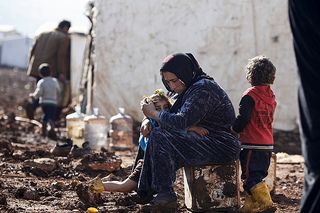
Freezing conditions in Lebanon’s Bekaa valley are making life even more difficult for Syrian refugees. Credit: Sam Tarling/Caritas
Fierce fighting in Syria continues to force families to flee the country for the third year. Now they face another crisis: winter. Temperatures are plummeting, making living conditions even more precarious for the refugees.
The number of Syrian refugees in Lebanon, Turkey, Jordan and Iraq is now over two million people. Most of them are women, children and the elderly.
Lebanon hosts the majority, where nearly one in five people is a Syrian refugee.
With rented accommodation too expensive, many Syrians have had to erect tents in Lebanon’s Bekaa Valley along the Syrian border or find shelter in abandoned buildings.
In Bekaa, refugees may have thought life couldn’t get much more bleak. But winter storms have added to the misery.
Alexa, the first regional snow storm of the season, hit Lebanon in mid-December, pushing temperatures below freezing and bringing blizzards, heavy snow and rain in northern Lebanon and the Bekaa.
In these two areas, a large number of refugees are sheltering in tents and wood or tin shacks in more than 250 settlements spread out in fields and outskirts of towns and cities.
In some places, over 10 cm of snow has covered the ground and many children are walking barefoot in the freezing mud or puddles.
The heavy rain has caused roofs to collapse as well. Two little girls were killed when the ceiling of their two-story home collapsed in Zahleh in Bekaa.
Caritas Lebanon, the UN, the government and other aid agencies are working to distribute plastic sheets and wood planks to cover tents, along with heathers, fuel coupons, food aid and warm clothes.
“The needs are huge and the means limited”, said the President of Caritas Lebanon, Monsignor Simon Faddoul. “Lebanon is the smallest country with the largest number of Syrian refugees. Without the help of our partners, we won’t be able to provide the proper assistance”.
Caritas members in Jordan and Turkey also have winterization programmes for the refugees.
Latin Patriarch Fouad Twal of Jerusalem thanked Caritas and all humanitarian organisations for their solidarity with “Syrian refugees, especially during this cold winter season.”
He called for a sustainable ceasefire and for the international community to work together to prevent more arms entering the country.
“As the Syrian problem cannot be resolved by the force of arms,” the patriarch said. “We call on all political leaders to assume the responsibility for finding a mutually acceptable political solution that will end the senseless violence, and uphold respect for the dignity of people.”
As bad the situation for the Syrian refugees is, it pales in comparison to the situation inside the country. More than 6.5 million people are internally displaced, and many of them are beyond the reach of humanitarian aid.
Despite the crisis in the region, Latin Patriarch Fouad Twal’s message was one of hope: “Christmas leads the eyes of the world to look towards Bethlehem. It is from here, in the midst of conflict and violence, tearing our Middle East apart, that the mystery of Christmas gently rises and spreads throughout the world.”
Caritas Syria president Msgr Antonie Audo said, “Pray with us for peace. Despite the violence, the people of Syria wait for a miracle like a night watchman waits for the dawn.”
